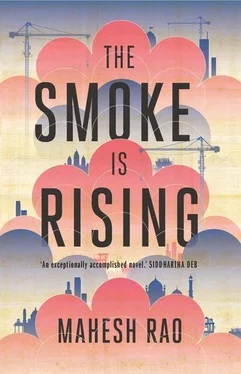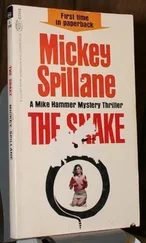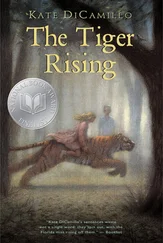But the shifting configurations of state patronage meant that his caste identity had reared up in a public arena to make him feel that his future was under assault. High levels of caste-based reservations had existed for years in South India but his awareness of them had been dim. It was only now that his consciousness snagged on the jagged tip of the protests erupting all around him. The student agitation in a number of North Indian cities was becoming increasingly violent. In Delhi a group of students from Girish’s college had tried to barricade parts of Race Course Road and Kemal Ataturk Road, both points a short distance from the Prime Minister’s official residence. Another group had attacked a police station in Moti Bagh, reports of arrests of students and custodial brutality having made their way back to the campus. This new realm of action was a jurisdiction too far for Girish, the supercilious wordsmith: he had never conceived of a reality beyond his finely crafted speeches.
Not long after he had spoken at a debating society meeting, the publication of an image in newspapers and magazines sent a devastating charge through the arteries of the urban elite. In one horrifying instant, a young man in a pale blue T-shirt, his upper body consumed by flames, faced the camera’s lens with an ossified grimace. The student was a commerce undergraduate who had walked into a busy junction outside his South Delhi college, doused his body with kerosene and set himself on fire in protest at the government’s decision to implement the Mandal recommendations. A number of self-immolations followed in other cities, each appalling incident polarising positions further. The serial debater, however, became curiously silent, fading into the dim hallways of his student hostel. His absence was noted but not acted upon in the frenzy of those eventful days.
Girish put an end to all his political activities and distanced himself from anyone who was likely to seek an explanation for his desertion. Instead he focused his energies on his studies, reaping an impressive number of gold medals by the time he graduated the following year. His activist days were never to return. They left only a hard certainty, like a cyst under his skin, that the world into which he was about to launch himself was one where, at the stroke of a pen, the meritorious could be ousted and their rewards expropriated. Girish returned to Mysore, the gait of a martyr already assimilated.

A distant rumble grew into a more discernible pattern of shouts and hand-clapping. At first it sounded like crowd noises from a radio but it was soon clear that this was something quite different. Susheela looked up from the book that she was holding.
‘What’s happening?’ she asked.
At that moment Ashok’s mobile phone rang and he apologetically put his hand up to Susheela as he answered it. She watched him as he murmured into the phone. The clamour seemed to be getting louder.
‘Madam, that was my son. Seems there is some agitation in the city. Those theme park farmers.’
‘What theme park farmers?’
‘They are having a dharna in the city today and I think there has been some trouble.’
Ashok looked grave and walked towards the door, beyond which the street seemed unusually forsaken. His mobile phone rang again and he answered it standing in the doorway, looking in both directions.
Susheela put her book down and moved to the window. Through the gaps in the wooden shelving she could see only a few pedestrians, a trickle of two-wheelers grumbling past and no autorickshaws at all.
The theme park farmers. There had been something in the paper about them, but with the endless reporting on the progress of HeritageLand, Susheela found it difficult to recall exactly who was aggrieved and for what reason.
‘Madam, I think I am going to have to shut the shop. They have closed both sides of MG Road and I think there has been a lathi charge.’
Susheela reached into her handbag for her mobile phone. She looked in every compartment, a hot rush spreading over her neck and chest. Then she searched again through the bag, tearing at zips and plunging her hand into linty corners, and then looked up at Ashok. There was a ghostly lull in the street outside but layered with invisible waves of ferment, an upheaval that did not give many clues as to its complexion.
‘I don’t have my phone with me. I must have left it in the car. I don’t know how to reach the driver,’ said Susheela.
‘Where is your driver?’
‘I don’t know. If there is no parking, he normally just goes round the block a few times but today, I don’t know, he must be stuck somewhere on the other side. And I don’t have his number here.’
Ashok’s phone rang again and he began nodding as he walked back towards his desk.
A police siren began to sound a couple of streets away: a grudging, plaintive noise. Moments later another siren joined the first, the loops of discordant caution appearing to surround the shop. The sound of the protest rose and fell like the swash of a distant ocean. As Susheela listened, a roar went up, followed quickly by a blast of whistles.
Ashok looked up for a moment and then continued talking quietly into his phone. Susheela looked out into the street again but there was no further indication of events unfolding a few blocks away. She chewed on the inside of her mouth. She was furious with herself for having left her phone in the car, furious at the driver for not noticing and furious at this ridiculous predicament where law-abiding members of society could not go about their business because of a bunch of disaffected thugs looking to cause trouble.
The crash of a shutter coming down next door sounded much louder than it ought to have done.
Ashok finished his call.
‘They have burnt a bus near KR Circle. I think the police have sealed off most of the area.’
‘What are we going to do?’
‘Madam, I’m very sorry but I have to close the shop. These goondas will start throwing stones through the windows any minute now. They don’t need an excuse.’
Susheela stared blankly at him.
‘Don’t worry, madam, I have my scooter here. I only live about twenty minutes away. You can come home with me and call someone to pick you up. My wife is at home. Please don’t worry, everything will be fine. I just don’t think we should stay here any longer, you know; anything can happen.’
‘You’re going to so much trouble. But you’re right, we can’t stay here. I think … thank you so much.’
Ashok took all the notes out of the cash register, snapped a rubber band around them and tucked them into his pocket. He locked the door to the stock room and switched the lights and fan off.
‘Okay madam, we can go now.’
They left the shop and Ashok locked the main door and quickly wound down and secured the shutter. More than half of the shops in the street were closed and no vehicles were moving. The trouble sounded more distinct now. A body of shouts, police whistles, a strange drumming and occasional loud bursts that sounded like fireworks. The empty pavement glistened in the noon glare.
‘Madam, one minute, madam. Don’t worry, I’m coming straight back.’
Susheela stared in horror as Ashok darted quickly down a side street and disappeared out of view.

The protest had begun with tractors parked all around KR Circle, blocking all the traffic going towards Devaraja Urs Road. The farmers had formed a human chain around the statue of Maharaja Krishnaraja Wodeyar mounted at the centre of the circle. Two groups had unfurled large banners where the assembled camera crews would be able to frame them with ease. Further down, a couple of trucks blocked the area around Gandhi Square. A number of speakers had stood up under the clock tower, each taking it in turns with the microphone rigged up to a small van on the other side of the square.
Читать дальше













